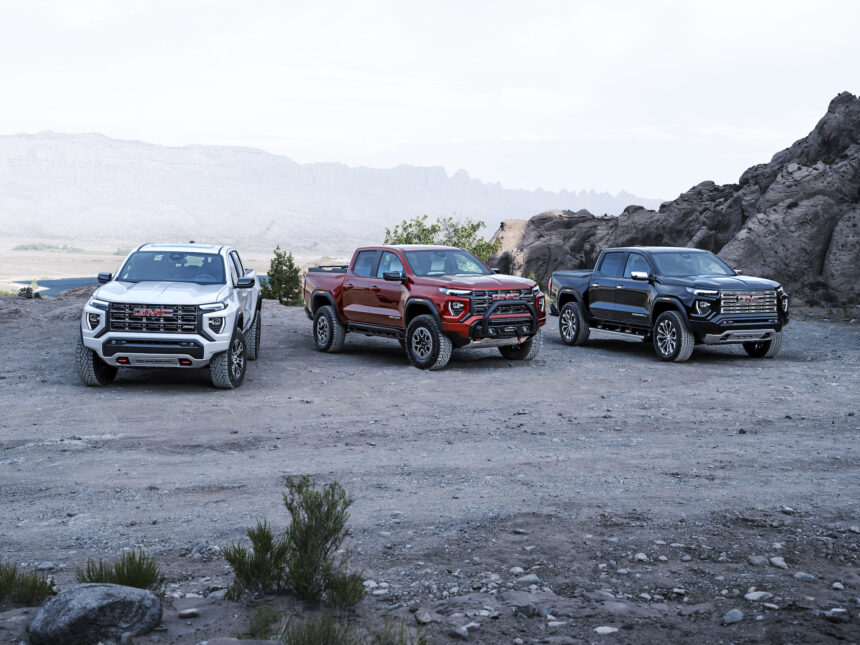In the realm of midsize pickup trucks, two models stand out as top contenders: the 2025 Chevrolet Colorado and the 2025 GMC Canyon. These trucks offer a more maneuverable and versatile option compared to their full-size counterparts, making them popular choices for off-roading and everyday use. While the Ford Maverick and its hybrid option have outsold both GM trucks combined, there is still a strong market for the Colorado and Canyon.
Both the Colorado and Canyon share similar features, including a crew-cab design, a 5-foot-2 bed, and a powerful 2.7-liter turbo-4 engine. However, the main differences between the two lie in their pricing and trim levels. The Colorado tends to offer less expensive versions, while the Canyon boasts more luxurious Denali packages. Despite these distinctions, both trucks have off-road capabilities, with the ZR2 and AT4X editions catering to adventurous drivers.
In terms of pricing and trims, the Chevy Colorado ranges from the base WT model at $33,500 to the top-tier ZR2 at $51,000. On the other hand, the GMC Canyon starts with the Elevation trim at $40,000 and goes up to the Denali at $53,600. The best picks from each lineup are the Colorado Trail Boss and the Canyon AT4.
For those looking for a fully loaded option, the Canyon Denali offers premium features such as Bose audio, a head-up display, and 20-inch wheels, while the Chevy Colorado ZR2 is a top choice for off-road enthusiasts with its impressive suspension lift and locking differential.
Both trucks come equipped with a 2.7-liter turbo-4 engine that delivers 310 horsepower and 430 lb-ft of torque, paired with an 8-speed automatic transmission. They can tow up to 7,700 pounds and have a payload capacity of nearly 1,700 pounds, making them versatile options for hauling and towing.
Overall, the choice between the Chevy Colorado and GMC Canyon comes down to personal preference and budget. While the Colorado may be more budget-friendly, the Canyon offers a more luxurious experience with its upscale trims. Whichever truck you choose, you can rest assured that you’ll be getting a capable and reliable midsize pickup from GM. The Chevrolet Colorado has a similar design to the GMC Canyon, with a wide grille and sculpted doors giving it a rugged appearance. The Colorado also offers different trim levels with varying interior finishes, from basic cloth seats in the WT edition to leather seats and upscale trim in the Z71 and ZR2 models. The Colorado features digital gauges and a touchscreen infotainment system, similar to the Canyon.
Overall, both the GMC Canyon and Chevrolet Colorado offer attractive designs that are not groundbreaking but still appealing. The Denali trim level of the Canyon stands out for its rich look and upscale features, while the ZR2 model of the Colorado offers superior off-road capabilities with its specialized hardware and features. Ultimately, both trucks provide a comfortable and stylish interior with modern technology and features to enhance the driving experience. The 2025 GMC Canyon and 2023 Chevrolet Colorado are both popular midsize trucks that offer a variety of features for consumers. Both models have different trim levels, such as the Trail Boss, LT, Z71, and ZR2, each with its own unique design elements.
The Trail Boss and LT versions of both trucks come with street-ready details like faux skid plates and body-color trim in the grille. The Z71 adds a gloss black grille and black bumper and mirror caps for a more aggressive look. The ZR2 stands out with real skid plates under the front end and a dual black bar across the nose.
In terms of fuel economy, the GMC Canyon rates at 19 mpg city, 23 highway, and 20 combined, while the Chevrolet Colorado rates at 19/24/21 mpg. The off-road models of both trucks with knobby tires get about 17 mpg combined, making the Colorado slightly more fuel-efficient.
When it comes to safety features, both the Canyon and Colorado have not been crash-tested yet. However, they both come with automatic emergency braking and off-road cameras that provide under-body views of obstacles. The Canyon has a four-star overall rating from the NHTSA, while the Colorado’s safety ratings are still pending.
Overall, the GMC Canyon earns a 5.3 out of 10 for its standard safety and convenience features, while the Chevrolet Colorado slightly edges out with a TCC Rating of 5.4 out of 10 due to its better fuel economy. In the end, the Colorado takes the win by a slim margin, making it the better choice for consumers looking for value in a midsize truck. The world of technology is constantly evolving, with new innovations and advancements being made every day. One of the most exciting developments in recent years is the rise of artificial intelligence (AI). AI is a branch of computer science that aims to create machines that can perform tasks that typically require human intelligence, such as speech recognition, decision-making, and problem-solving.
One of the key areas where AI is making a significant impact is in the field of healthcare. AI has the potential to revolutionize the way we diagnose and treat diseases, making healthcare more efficient, accurate, and personalized. From machine learning algorithms that can analyze medical images to chatbots that can provide patients with personalized medical advice, AI is transforming the healthcare industry in numerous ways.
One of the most promising applications of AI in healthcare is in the field of medical imaging. AI algorithms can analyze images from X-rays, MRIs, and CT scans to detect abnormalities and assist radiologists in making more accurate diagnoses. This can help doctors catch diseases at an earlier stage, leading to better outcomes for patients.
AI is also being used to improve patient care and outcomes. For example, AI-powered chatbots can provide patients with personalized medical advice, helping them manage their conditions more effectively. AI can also be used to predict patient outcomes and identify high-risk individuals, allowing healthcare providers to intervene early and prevent complications.
In addition to improving patient care, AI is also helping to streamline healthcare operations. AI algorithms can analyze vast amounts of data to identify patterns and trends, helping healthcare providers make more informed decisions. This can lead to cost savings, improved efficiency, and better resource allocation.
Despite the many benefits of AI in healthcare, there are also challenges and concerns that need to be addressed. For example, there are concerns about the privacy and security of patient data, as well as the potential for bias in AI algorithms. It is important for healthcare providers to carefully consider these issues and implement appropriate safeguards to protect patient information and ensure the ethical use of AI.
Overall, AI has the potential to revolutionize the healthcare industry, improving patient care, outcomes, and efficiency. By harnessing the power of AI, healthcare providers can better diagnose diseases, personalize treatment plans, and improve the overall quality of care. As AI continues to advance, the future of healthcare looks brighter than ever.







